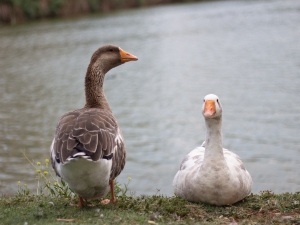
We’ve all suffered congestion and it’s not a pretty sight, and it doesn’t feel too great either. Congestion is a sign that we are sick, but does the same apply to ducks who sound congested?
This article looks into why your duck may sound congested.
Table of Contents
Why does my duck sound congested?
You shouldn’t really be able to hear your duck breathe, if you can hear the bird breathe, and the bird sounds like it is congested then you’d likely be worried.
Here is why your duck may sound congested:
Blocked nostrils:
One of the simplest and least dangerous reasons why your duck may sound congested may be that the bird has a blocked nostril.
Ducks need to dunk their heads in water regularly to clean out their nostrils.
The birds use their beaks to find things, and to eat. Because of this, a lot of things can find their way up the bird’s nostril and get stuck in there if not flushed out through the regular dunking of the bird’s head.
Your duck’s nostril should be clear, clear enough that you can pretty much see daylight if you look through one nostril into the other. If you can’t see through then the bird may have a blockage in its nose,
What to do:
Check to see if the bird does indeed have a blocked nostril. Look through one nostril looking in the direction of the other and see if it is clear, if it is not clear then there is something stuck in there.
This can be remedied by giving the birds bowls of water deep enough that the bird can dunk their whole heads into.
When needed, the birds will dunk their heads in these bowls and clear their nares (nostrils).
Avoid using forceps and trying to dig the blockage out, ducks have sensitive sinus cavities and you can easily damage them if you try to fish out whatever is stuck up there.
Respiratory infection:
Your duck may also have a blocked-up nose because the bird is sick with a respiratory infection.
If your bird’s nares are plugged up then the bird will breathe but sound congested, or, the bird will breathe through its mouth because it can’t breathe through its nares.
A variety of things can cause your bird to develop a respiratory infection including bacteria, viruses, fungi, and parasites.
Other signs of respiratory infection in your bird include wheezing, sneezing, coughing, self isolation, discharge from the nares and lethargy.
What to do:
The recommended thing to do is to take your bird to the vet as soon as you can. If you can’t immediately get your bird to the vet then isolate the bird to keep it from infecting other birds.
You can put your congested duck into a pet carrier and leave food and water for the bird inside. Also, add soft flooring to the pet carrier so the bird is comfortable.
Once at the vet, the bird will be examined and tested and then given treatment according to what respiratory infection the bird has.
If you enjoyed this article then you may also be interested in other bird related articles. Here are some articles that you may be interested in: Duckling Foaming At The Mouth, Duck Not Cleaning Itself, Duck Has Mucus Coming Out Of Mouth, Yellow Mucus Coming From Ducks Mouth, Duck Dragging Bottom

